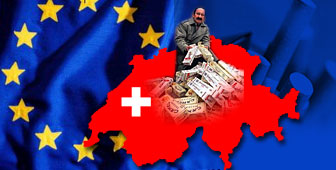Swiss under EU pressure to clamp down on cigarette smuggling

The trial in Ticino of a suspected cigarette smuggler, Gerardo Cuomo, has highlighted a major fault line in relations between Switzerland and the European Union. Brussels says unless Switzerland clamps down on contraband cigarettes and other cross border crime, it will not press ahead with closer bilateral ties.
A spokesman for the EU’s budget commissioner, Luc Véron, summed up Brussels’ concerns in an interview with swissinfo.
“The Cuomo case is a sign that not everything is fine in terms of cooperation between the EU and Switzerland,” said Véron. “When Cuomo’s extradition does take place, he can only be prosecuted in Italy for some of his crimes, not for [cigarette] smuggling, for example.”
Véron was referring to a decision by Switzerland’s Federal Court to allow the extradition of Gerardo Cuomo, who is wanted by Rome for cigarette smuggling. He is likely to be sent back to Italy soon after his trial in Lugano is over.
However, the court ruled that Italy could not prosecute Cuomo for cigarette smuggling because it is treated as a customs offence by Swiss law, and as such doesn’t qualify for cross-border judicial assistance.
The case has already led to a diplomatic row between Bern and Rome. Shortly after Cuomo’s arrest Ottoviano Turco, then Italy’s finance minister, rebuked Switzerland for having “sheltered” Cuomo.
Cross-border fraud
That row was defused by the signing of a legal cooperation agreement between the two countries last year. Now the EU is pushing for a similar agreement, under which it wants Switzerland to take tougher action against cross-border fraud, and particularly cigarette smuggling.
The EU’s budget commissioner, Michaele Schreyer, says the Union loses “billions” of euros annually to cigarette smuggling, and Brussels has made Swiss concessions a precondition for future bilateral negotiations on other issues.
Switzerland has agreed, in principle, to meet the EU’s demands. “We have no interest in harbouring criminals and in depriving the EU of income that is rightfully theirs,” says Hermann Kästli, deputy director of the federal customs office.
Swiss and European negotiators have held explorative talks in the past couple of months. The EU commission has already been given a mandate to start negotiations proper, and the Swiss cabinet is expected to give its go-ahead for talks to begin before the summer break.
From what has emerged from the tentative talks, Bern and Brussels disagree on the scope that a future anti-fraud agreement should cover. The EU would like to obtain cooperation in every case that is considered fraud under EU law – which includes not only smuggling, but also the evasion of indirect taxes and illegal claims to subsidies.
Switzerland, on the other hand, wants to retain its distinction between an “evasion” of regulations (which includes tax evasion as well as smuggling), and their “fraudulent” violation. To be classified as “fraudulent”, cases must involve criminal activities, such as forgery.
At present, Switzerland permits judicial assistance to foreign investigators only when the case involves “fraudulent” activity. To meet the EU’s demands, Swiss negotiators have offered to extend the list of specific offences that qualify for cooperation and enforcement measures.
Kästli says that in the case of cigarette smuggling and other offences, the deciding factor could be whether an illegal operation is pursued in a “businesslike manner” – rather than whether it is considered fraudulent.
The spokesman for Switzerland’s ministry of finance, Daniel Eckmann, told swissinfo that the EU wanted an agreement as quickly as possible. But he said Brussels had to understand that any deal that altered the fundamentals of Swiss law was bound to be overturned by Swiss voters in a referendum.
Swiss banking secrecy, one such fundamental, also hinges on Switzerland’s tolerant attitude towards the “mere” evasion of tax laws, as opposed to tax fraud. Banking secrecy laws can only be set aside where fraud or similar major offences such as money laundering can be proven.
Cigarette smuggling has a long history in Switzerland, where tobacco prices have traditionally been much lower than in neighbouring countries. For years before and after the Second World War, families in the south of Switzerland made their living carrying contraband cigarettes across the border to Italy.
In the past decade, however, the illegal trade in cigarettes, and to a minor extent in spirits and subsidised EU meat, has become much more sophisticated. Typically, while the trade is organised from Switzerland, the contraband goods never actually reach the country itself.
Instead, they are directed from producer country in the EU to the Balkans, and then transported by speedboat across the Adriatic into Italy, from where they are sold cheaply in other EU member states.
by Markus Haefliger

In compliance with the JTI standards
More: SWI swissinfo.ch certified by the Journalism Trust Initiative








You can find an overview of ongoing debates with our journalists here . Please join us!
If you want to start a conversation about a topic raised in this article or want to report factual errors, email us at english@swissinfo.ch.